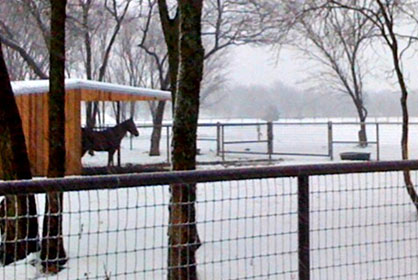Protect Your Horse From Potomac Horse Fever Before First Frost
Horses can be exposed to this disease in many different areas, especially since PHF has been identified in 43 states.4 It is always best to be prepared, plan ahead and contact your veterinarian to determine what actions you can take to prevent PHF.
One way to make sure you’re protecting your horse is by vaccination. Vaccinations serve as tools that horse owners can use to reduce the risk of PHF. POTOMAVAC™, made by Merial, has been proven to be effective in preventing PHF.5
“Using POTOMAVAC to vaccinate against PHF can offer the protection your horse needs,” says Cheramie.
When water is warm, the bacterium that causes PHF passes out of the water snails and is picked up by aquatic insects.6 Those aquatic insects, such as damselflies, caddis flies and mayflies, are carriers of the bacteria that can cause fever, diarrhea, laminitis and death in horses.7
Horse owners can take measures to reduce the populations of insects that can carry the organism that cause the disease. Good farm management practices include keeping your horse’s food covered, restricting grazing near creeks or other bodies of water and using repellents to decrease fly and other insect problems in your barn.8
Keeping PHF prevention a priority until the first hard frost will decrease the chances of your horse being affected by PHF.
Outbreak Alert
Stay informed about certain outbreaks such as PHF by signing up to receive free notification emails or texts as outbreaks are confirmed in specific areas. Outbreak Alert is a free online resource created by Merial to track confirmed cases of reportable diseases.
Always consult your equine veterinarian if you suspect any disease, and ask about using POTOMAVAC to help protect your horse against PHF.
About Merial
Merial is a world-leading, innovation-driven animal health company, providing a comprehensive range of products that focus on disease prevention and overall health and wellness in animals. Merial has three main business areas: pets, farm animals, and veterinary public health, and our health solutions target more than 200 diseases and conditions across a variety of species. Merial employs 6,900 people and operates in more than 150 countries worldwide with over €2.5 billion of sales in 2015. Merial is a Sanofi company. For more information, please seewww.merial.com; @Merial.
™POTOMAVAC is a trademark of Merial. ©2016 Merial, Inc., Duluth, GA. All rights reserved. EQUIBPM1601 (10/16)
1 Based on Market Dynamics, Inc. AHS current study data. Ranking represents cumulative dollar sales volume.
2 Potomac Horse Fever. American Association of Equine Practitioners.http://www.aaep.org/info/potomac-horse-fever. Accessed July 20, 2016.
3 Waite K. Potomac Horse Fever until proven otherwise. Michigan State University Extension.http://msue.anr.msu.edu/news/potomac_horse_fever_until_proven_otherwise. Published July 27, 2015. Accessed July 20, 2016.
4 Madigan JE, Pusterla N. Life cycle of Potomac Horse Fever – implications for diagnosis, treatment and control: a review. AAEP Proceedings. 2005;51:158-162.
5 Merial trial ER 8-88-22.
6 Wilson J. Hot weather and infectious diseases. University of Minnesota Extension.http://www.extension.umn.edu/agriculture/horse/health/hot-weather-and-infectious-diseases/. Accessed July 20, 2016.
7 Wilson JH, Pusterla N, et al. Incrimination of mayflies as a vector of Potomac Horse Fever in an outbreak in Minnesota. AAEP Proceedings. 2006;52:324-328.
8 Lenher E. Potomac Horse Fever. Available at: http://www.aaep.org/info/horse-health?publication=742. Accessed September 28, 2016.











